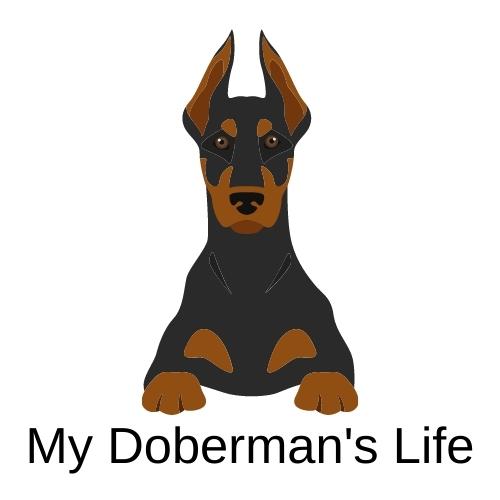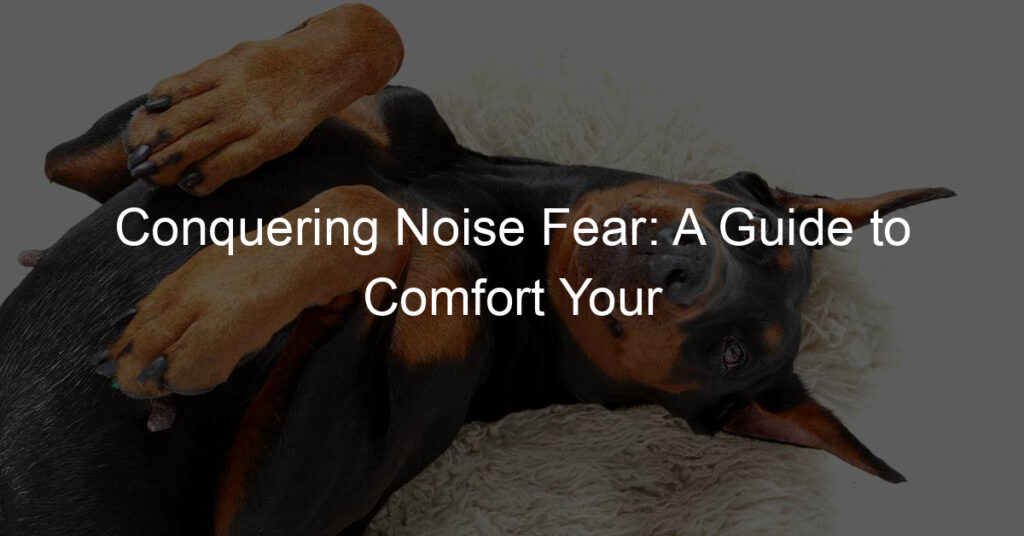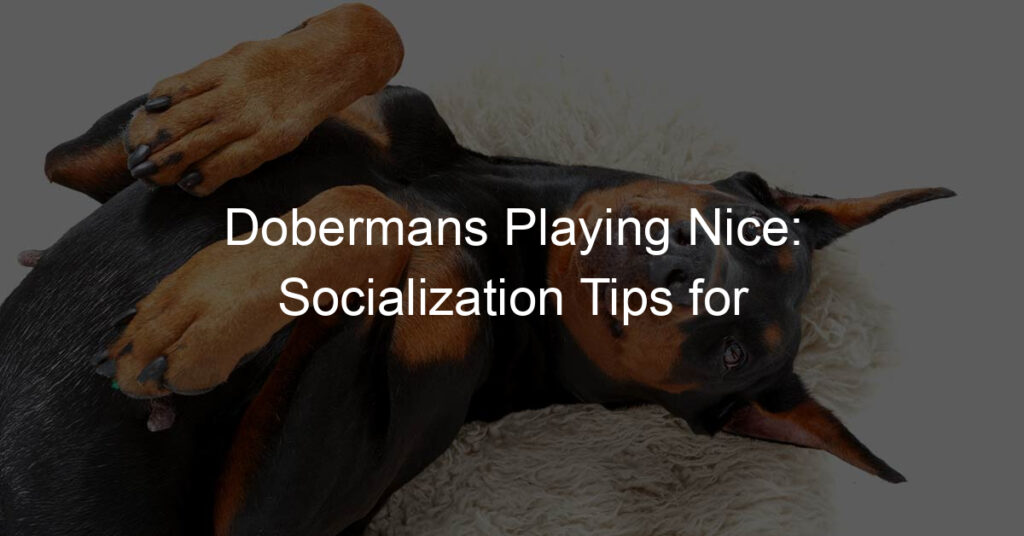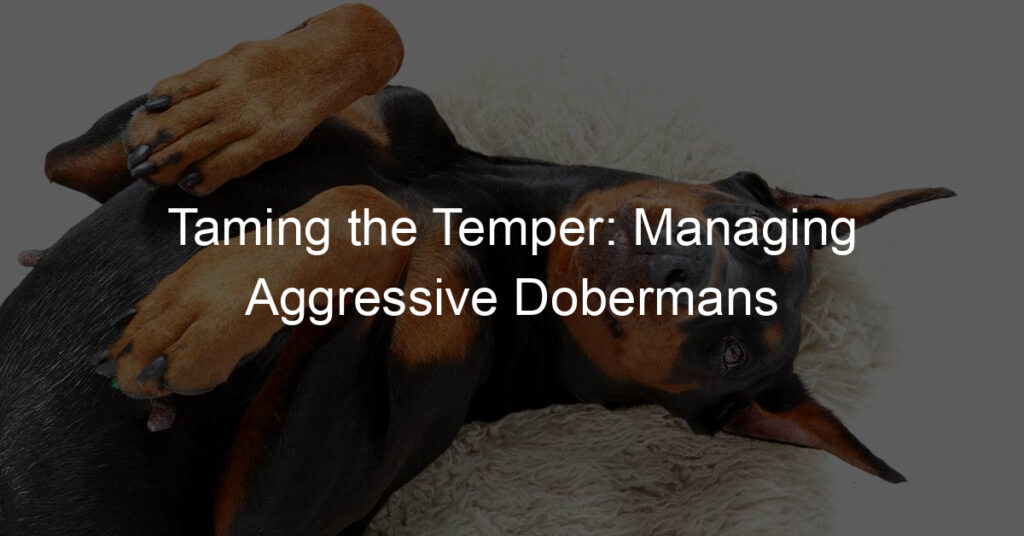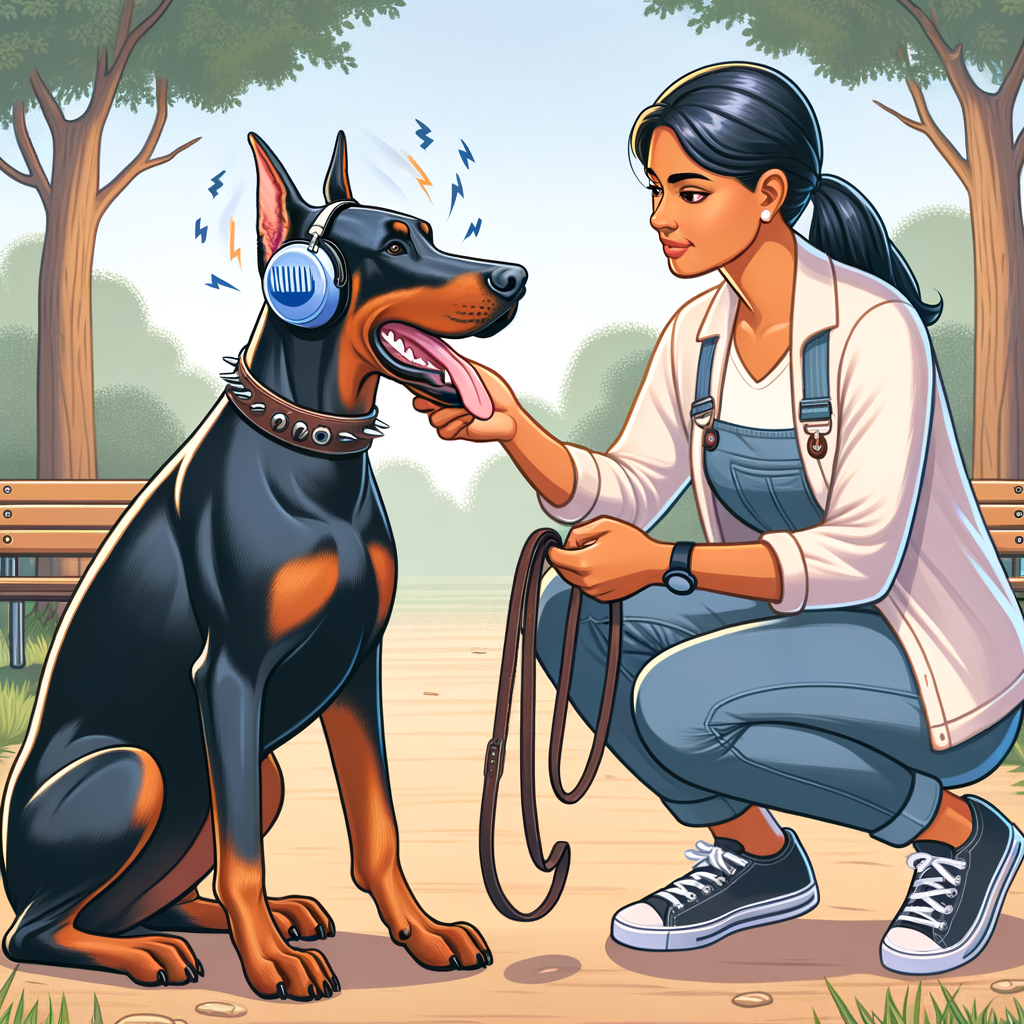
Understanding Doberman Fear of Loud Noises
Dobermans, like many other dog breeds, can develop a fear of loud noises. This fear can manifest in various ways and can have a significant impact on a Doberman’s health and behavior. In this section, we will explore the signs of noise anxiety in Dobermans, understand the causes, and discuss the potential effects on their health and behavior.
- Identifying Signs of Doberman Noise Anxiety
- Understanding the Causes of Loud Noise Fear in Dobermans
- Impact of Noise Fear on Doberman’s Health and Behavior
Dobermans with noise anxiety may show several signs. These can include behaviors like hiding, shaking, or excessive barking during loud events such as thunderstorms or fireworks. They may also display physical symptoms such as drooling, panting, or pacing. It’s important to note that these signs can vary from dog to dog, and what may be a sign of anxiety in one Doberman may not be in another.
The fear of loud noises in Dobermans can be caused by a variety of factors. Some Dobermans may have had a traumatic experience with a loud noise in the past, leading to a conditioned fear response. Others may have a genetic predisposition to noise anxiety. Additionally, lack of exposure to different sounds during their early development stages can also contribute to this fear.
Noise fear can have a significant impact on a Doberman’s health and behavior. Long-term stress from noise anxiety can lead to health issues such as digestive problems and weakened immune systems. Behaviorally, Dobermans with noise fear may become more aggressive or withdrawn. They may also develop other fear-related behaviors, such as separation anxiety or generalized anxiety disorder.
In the following sections, we will discuss strategies for helping your Doberman cope with noise phobia and provide coping mechanisms to manage this fear effectively.
Helping Your Doberman with Noise Phobia
It is not uncommon for Dobermans to develop a fear of loud noises. This can be a challenging issue to deal with, but with the right approach, you can help your Doberman overcome this fear. Here are some effective fear training techniques that you can use.
Doberman Fear Training
Training your Doberman to overcome their fear of loud noises involves a systematic approach. Here are three key steps that you should follow:
- Introducing noise gradually
- Positive reinforcement techniques
- Consistency in training
Start by exposing your Doberman to the noise that scares them at a very low volume. Gradually increase the volume over time as your dog becomes more comfortable. This process is known as desensitization and is a proven method for helping dogs overcome their fears.
While you are introducing the noise gradually, make sure to reward your Doberman for remaining calm. This could be in the form of treats, praise, or petting. The goal is to create a positive association with the noise.
Consistency is key when it comes to fear training. Make sure to practice these techniques regularly and maintain a consistent approach. It may take some time, but with patience and consistency, your Doberman can overcome their fear of loud noises.
Remember, every dog is unique and what works for one may not work for another. It’s important to be patient and persistent. With time and consistent training, your Doberman can learn to cope with their noise phobia.
Doberman Noise Fear Treatment
When it comes to treating your Doberman’s fear of loud noises, there are several options available. These range from professional dog training to medication and alternative therapies. Let’s explore each of these in more detail.
-
Consulting a Professional Dog Trainer
One of the most effective ways to help your Doberman overcome their fear of loud noises is to consult with a professional dog trainer. These experts have the knowledge and experience to help your pet understand and cope with their fear. They can provide you with a customized training plan that gradually exposes your dog to the noises they fear in a controlled and safe environment. This method, known as desensitization, can be very effective in reducing your pet’s fear.
-
Medication Options for Severe Cases
In severe cases, when the fear is so intense that it affects your Doberman’s quality of life, medication may be necessary. There are several types of medication that can help reduce anxiety and fear in dogs. These should always be prescribed by a vet and used in conjunction with behavior modification techniques. Remember, medication is not a cure, but a tool to help your pet cope better while they learn to manage their fear.
-
Alternative Therapies for Doberman Noise Fear
Alternative therapies can also be beneficial for Dobermans suffering from noise fear. These can include things like aromatherapy, massage, and even music therapy. For instance, playing calming music during a thunderstorm can help soothe your pet’s nerves. Similarly, certain scents like lavender can have a calming effect on dogs. It’s important to remember that what works for one dog may not work for another, so it may take some trial and error to find what works best for your Doberman.
In conclusion, treating a Doberman’s noise fear can involve a combination of professional training, medication, and alternative therapies. It’s important to remember that every dog is unique, so what works for one may not work for another. Always consult with a professional before starting any new treatment plan.
Coping Mechanisms for Doberman Noise Fear
Helping your Doberman cope with noise fear can be a challenging task. However, with the right strategies, you can help your furry friend feel safe and secure. Here are some coping mechanisms that you can implement:
Creating a Safe Space
Creating a safe space for your Doberman is a crucial step in managing noise fear. Here’s how you can do it:
- Choosing the right location: Choose a quiet, comfortable area in your home where your Doberman can retreat during noisy events. This could be a spare room, a corner in your living room, or even a large closet.
- Providing comfort items: Fill the safe space with items that your Doberman finds comforting, such as their favorite blanket, toys, or a piece of your clothing.
- Training your Doberman to retreat to the safe space: Train your Doberman to go to their safe space on command. This can be done using positive reinforcement techniques, such as treats and praises.
- Using toys to distract your Doberman: Toys can be a great distraction during noisy events. Choose toys that your Doberman enjoys and can keep them occupied for a while.
- Engaging in play during noisy events: Playing with your Doberman during noisy events can help distract them and reduce their fear.
- Using music or white noise to mask the loud noises: Playing soft music or white noise can help mask the loud noises and soothe your Doberman.
- Establishing a regular training schedule: Regular training can help your Doberman become more comfortable with their safe space and understand that it’s a place to retreat during noisy events.
- Progressing with noise exposure gradually: Gradually expose your Doberman to louder noises to help them become more comfortable over time. Start with soft noises and gradually increase the volume over time.
- Reinforcing positive behavior: Always reward your Doberman for positive behavior. This can help them associate positive experiences with the safe space and noisy events.
- When to seek help from a professional: If your Doberman’s noise fear is severe and not improving with these strategies, it may be time to seek help from a professional.
- Choosing the right professional for your Doberman: Choose a professional who has experience dealing with noise fear in dogs, particularly Dobermans.
- Working with the professional: What to expect: A professional can provide a tailored treatment plan for your Doberman, which may include behavior modification techniques and possibly medication.
Case Studies
Let’s look at some case studies that highlight the effectiveness of these coping mechanisms:
- Case Study 1: Using gradual exposure to reduce noise fear: A Doberman named Max was terrified of thunderstorms. His owner started playing recordings of thunderstorms at a low volume and gradually increased the volume over time. Max is now much less fearful during actual thunderstorms.
- Case Study 2: The impact of professional training on a Doberman with severe noise anxiety: Bella, a Doberman with severe noise anxiety, showed significant improvement after working with a professional dog trainer. The trainer used behavior modification techniques to help Bella cope with her fear.
- Case Study 3: The role of medication in treating Doberman noise fear: In some cases, medication may be necessary. A Doberman named Rocky was prescribed anti-anxiety medication by a vet, which, combined with behavior modification techniques, significantly reduced his noise fear.
Remember, understanding and recognizing your Doberman’s fear is the first step towards helping them. Implement these training and coping mechanisms, and don’t hesitate to seek professional help when necessary. Patience and consistency are key in helping your Doberman overcome noise fear.
